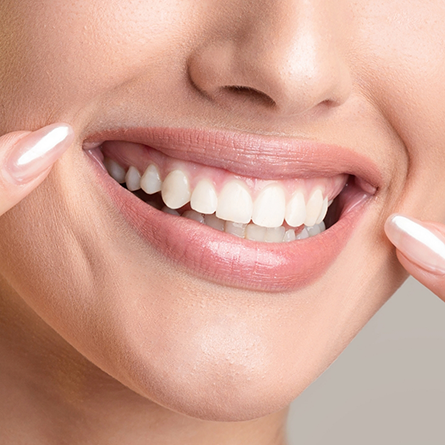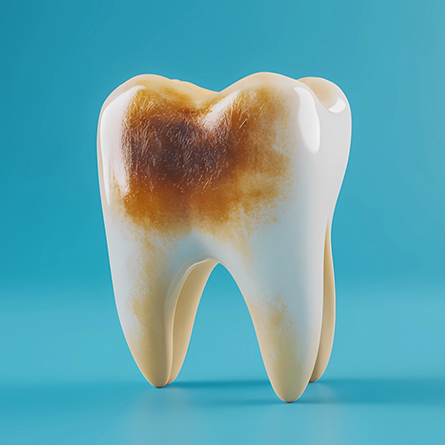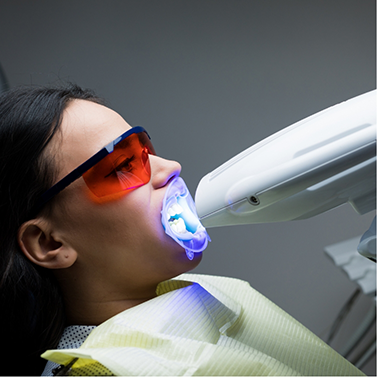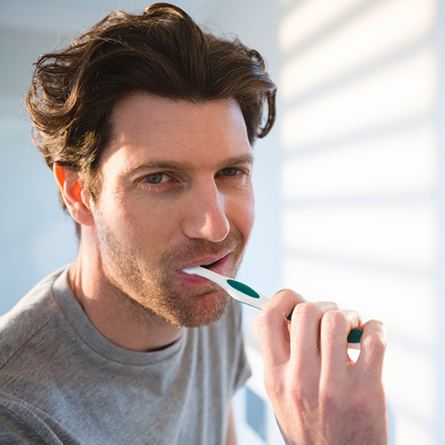Teeth Whitening Portland
The Safe & Trusted Way to Brighten Your Smile

Teeth whitening treatments are popular cosmetic dental procedures that effectively and safely provide you with a brilliantly bright smile. If you want a smile that’s brighter and whiter, we recommend you chat with our dentists here at Belmont Family Dentistry about which whitening procedures would work the most effectively for you.
Teeth whitening treatments here in Portland are inexpensive procedures, and depending on your preference, you can choose to whiten just your upper teeth or both the top and bottom rows. With just one treatment, you will be amazed at the results and feel confident enough to smile.
Why Choose Belmont Family Dentistry for Teeth Whitening?
- Knowledgeable Team of 3 Dentists
- Flexible Financing Through CareCredit
- 500+ 5-Star Patient Reviews on Google
What Causes Tooth Discoloration?

Tooth discoloration or yellowing is caused by a number of factors, including:
- Poor dental hygiene
- Advancing age (natural tooth enamel breaks down, revealing the yellowish color of dentin)
- Smoking or using other tobacco products
- Caffeine intake, for example, coffee and tea
- Certain drugs or medication (e.g., tetracycline, an antibiotic)
- Trauma
- Genetics (some people have naturally yellowish teeth)
- Fluorosis
Who Is a Good Candidate for Teeth Whitening?

Teeth whitening and bleaching may be right for you if you have:
- Generalized stains on your teeth
- Aging teeth
- Smoking and dietary stains on your teeth from tea and coffee
- Dental fluorosis (having multiple spots on your teeth from fluoride)
- Tetracycline staining (improves but doesn’t correct it totally)
- Changes to the inside of your tooth (e.g. death of the nerve or root canal treatment)
Note that not all whiteners are created equal. Some may not be able to correct all kinds of teeth discolorations. For example, if your teeth have a yellowish hue, they will probably bleach well. Brownish-hued teeth, on the other hand, aren’t as likely to bleach very well. And grayish-hued teeth are the least likely to bleach well.
Keep in mind that if you’ve had either tooth-colored fillings or bonding put on your front teeth, the whitener will not change the color of the fillings or bonding, which means these materials will become more obvious after you have your teeth whitened. If this could happen, you might want to consider getting veneers or dental bonding, which looks more natural.
How Does Teeth Whitening Work?

Professional in-office and at-home options for teeth whitening and bleaching are the preferred method, as they are dentist-supervised-whitening products. They are more effective than OTC whitening kits because they have greater concentration levels of hydrogen peroxide or carbamide peroxide, which offer faster, longer-lasting results.
Take-Home Teeth Whitening
For your convenience, we offer professional take-home teeth whitening trays that are customized to provide maximum, even coverage of the whitening gel onto your teeth. Simply wear the trays once a day for two weeks to achieve optimal brightness!
In-Office Teeth Whitening
For our patients who are looking to achieve faster results, we also offer in-office teeth whitening. The whitening gel is professionally applied to your teeth by our trained staff, allowing you to leave with a smile that’s up to eight shades brighter within the hour.
Tips for Maintaining a Brighter Smile

There are several things you can do to maintain your brighter smile, including:
- Avoiding foods and beverages that cause teeth to become stained
- Using a straw so that liquids bypass your front teeth
- Brushing or rinsing immediately after consuming stain-causing beverages or foods
- Brushing your teeth twice daily and flossing at least once daily to remove plaque
- Using a whitening toothpaste once or twice a week to remove surface stains and prevent yellowing
Teeth Whitening FAQs
Are Over-The-Counter Teeth Whitening Kits Effective?
OTC whitening kits produce some results, but they are not as long-lasting as at-home or in-office approaches. If you do use these kits, use ones that bear the ADA’s Seal of Acceptance indicating that they are both safe and effective for whitening when used as directed.
Who Would Not Be a Candidate for Teeth Whitening?
Teeth whitening and bleaching is not indicated for patients who:
- Have decay in their mouth, gum disease, or infection underneath their teeth
- Are pregnant or breastfeeding
- Have a peroxide allergy
- Have tooth sensitivity
- Have cracked and exposed dentine (once treated, these teeth can be whitened or bleached)
- Have discoloration from medications or a tooth injury
Are There Any Adverse Effects Associated with Teeth Whitening?
Not all patients experience side effects after teeth whitening or bleaching, but those who do report tooth sensitivity and gum irritation. For many, these effects are temporary, not lasting more than 1 or 2 days after treatment. To soothe the tingling feeling in the teeth, patients are advised to use toothpaste for sensitive teeth.
Is Teeth Whitening Permanent?
No, teeth whitening is not permanent, because people expose their teeth to a lot of foods and beverages that cause staining. As a result, these patients may start to notice that the whitening is fading within a month after treatment. Most people find they need a touch-up every 4 to 6 months. Others who avoid foods and beverages that stain the teeth may enjoy the benefits of teeth whitening for up to a year after treatment.
